#like what if i WASN’T plagued with a constant feeling of inadequacy over the literal body thag I was just... given
Photo

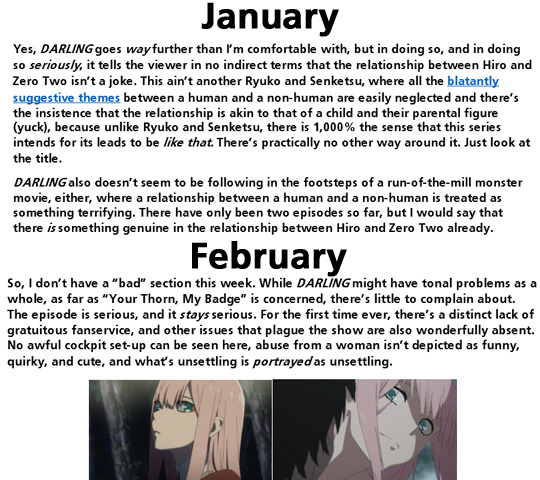
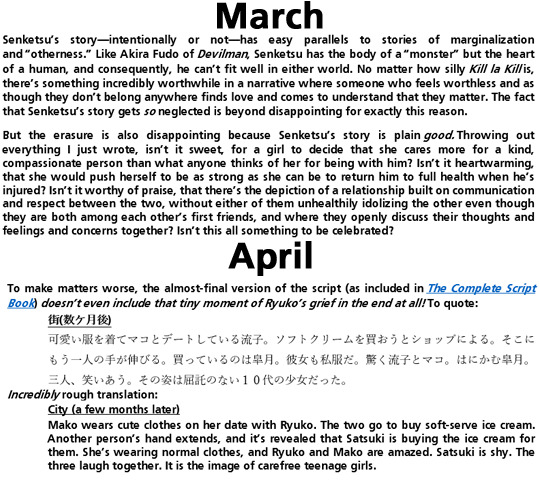
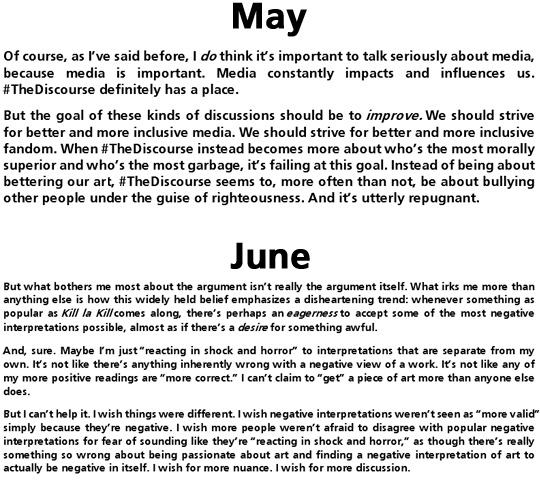

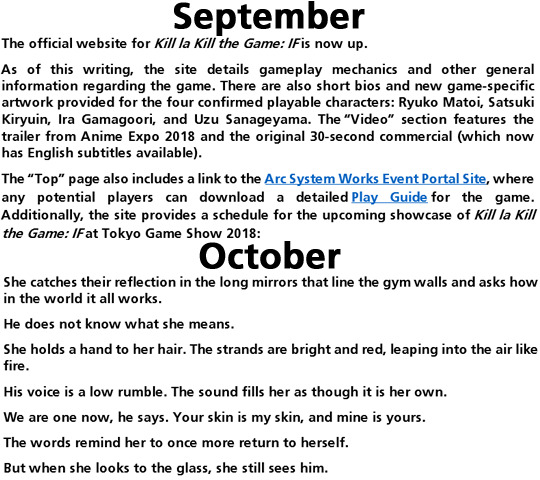
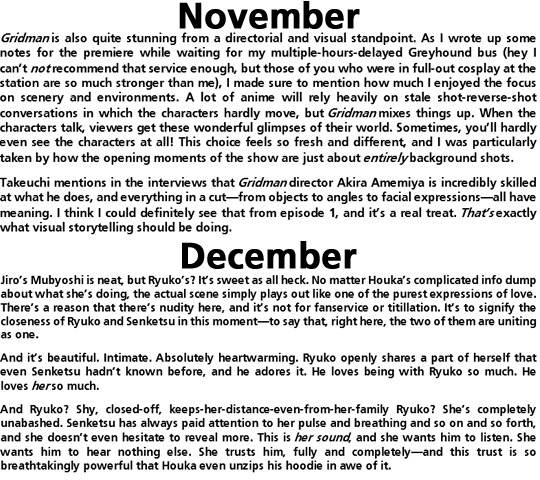
I can’t think of anyone else who does this kind of year-in-review compilation for writing, but I put one together for 2017 and would like to continue to do so. It’s just nice to get a sense of what I’ve accomplished in 12 months, especially when I feel that I haven’t accomplished much of anything.
Unlike last year, though, I’m including all kinds of writing I’ve done this time around. My non-fiction work is important to me, too.
Mental health talk and text versions of these snippets under the cut.
To cut right to the chase, 2018 was rough. No matter all my flowery pep talks trying to be positive and uplifting, my feelings of inadequacy skyrocketed. I drenched myself in my own self-depreciating “humor,” and I ridiculed my hopes and dreams. Every time I felt my work was poorly received, I’d tell myself, “Well, what did you think would happen? That people would actually like what you do?”
But I never wanted to stop “keeping on.” I wanted to continue what I loved no matter what, and I threw myself into my writing. There would be days where I wouldn’t eat or do anything else until I’d finished an essay. I spent practically the entire month of November sleeping on my couch because I never wanted to “go to bed” until I had written more, posted more, done more. My head became filled with a constant mantra of, “You’ll never be enough.”
And I wanted to prove myself wrong. I wanted to be something—even if that something was just being happy with myself. But all the proclamations that I’m “getting better!” and “improving so much!” never did much for my confidence. What good is progress, after all, if I still feel like I’m nowhere?
Still, I tried to be productive about my failure. So I wasn’t satisfied with what I was doing. What could I do to be satisfied? I took different approaches to my content. I asked for advice, opinions. But that feeling of being nothing remained.
And yet, I’d always say things like, “I’m okay. I’m just frustrated.” Or, “I felt better after I binged some Netflix, haha.” I wanted to be helpful, inspiring. I wanted to tell people that it’s hard, but it gets better. I wanted to come off as the happy person I so wish to be, and I felt guilty every time I revealed any of my insecurities. Nobody wants to hear that stuff. Everyone suffers. I’m not special.
So maybe that’s why I feel it’s important to say now that I’m not okay. I’m hurting. I’m in pain. There are times I hate myself so much that I can think of nothing but how I’m ugly both inside and out, that I’m selfish, ungrateful, a total bitch.
And I want to be better! Of course I do. And I want to continue to work to be better.
But right now? I’m not okay. And running away from that fact and trying to hide it won’t help me or anyone else.
It was a rough year. I feel I made a total fool of myself more times than I would care to admit. But I also created a lot of art. I shared a lot of art with the world.
And you know what? I am proud of myself. I did impact people with what I did. I answered over 100 asks! I added more than 17 pages to my “replies” tag! I’m not nothing, and I need to stop treating myself like I am!
On to a better, healthier 2019!
Texts
January
Yes, DARLING goes way further than I’m comfortable with, but in doing so, and in doing so seriously, it tells the viewer in no indirect terms that the relationship between Hiro and Zero Two isn’t a joke. This ain’t another Ryuko and Senketsu, where all the blatantly suggestive themes between a human and a non-human are easily neglected and there’s the insistence that the relationship is akin to that of a child and their parental figure (yuck), because unlike Ryuko and Senketsu, there is 1,000% the sense that this series intends for its leads to be like that. There’s practically no other way around it. Just look at the title.
DARLING also doesn’t seem to be following in the footsteps of a run-of-the-mill monster movie, either, where a relationship between a human and a non-human is treated as something terrifying. There have only been two episodes so far, but I would say that there is something genuine in the relationship between Hiro and Zero Two already.
February
So, I don’t have a “bad” section this week. While DARLING might have tonal problems as a whole, as far as “Your Thorn, My Badge” is concerned, there’s little to complain about. The episode is serious, and it stays serious. For the first time ever, there’s a distinct lack of gratuitous fanservice, and other issues that plague the show are also wonderfully absent. No awful cockpit set-up can be seen here, abuse from a woman isn’t depicted as funny, quirky, and cute, and what’s unsettling is portrayed as unsettling.
March
Senketsu’s story—intentionally or not—has easy parallels to stories of marginalization and “otherness.” Like Akira Fudo of Devilman, Senketsu has the body of a “monster” but the heart of a human, and consequently, he can’t fit well in either world. No matter how silly Kill la Kill is, there’s something incredibly worthwhile in a narrative where someone who feels worthless and as though they don’t belong anywhere finds love and comes to understand that they matter. The fact that Senketsu’s story gets so neglected is beyond disappointing for exactly this reason.
But the erasure is also disappointing because Senketsu’s story is plain good. Throwing out everything I just wrote, isn’t it sweet, for a girl to decide that she cares more for a kind, compassionate person than what anyone thinks of her for being with him? Isn’t it heartwarming, that she would push herself to be as strong as she can be to return him to full health when he’s injured? Isn’t it worthy of praise, that there’s the depiction of a relationship built on communication and respect between the two, without either of them unhealthily idolizing the other even though they are both among each other’s first friends, and where they openly discuss their thoughts and feelings and concerns together? Isn’t this all something to be celebrated?
April
To make matters worse, the almost-final version of the script (as included in The Complete Script Book) doesn’t even include that tiny moment of Ryuko’s grief in the end at all! To quote:
街(数ケ月後)
可愛い服を着てマコとデートしている流子。ソフトクリームを買おうとショップによる。そこにもう一人の手が伸びる。買っているのは皐月。彼女も私服だ。驚く流子とマコ。はにかむ皐月。三人、笑いあう。その姿は屈託のない10代の少女だった。
Incredibly rough translation:
City (a few months later)
Mako wears cute clothes on her date with Ryuko. The two go to buy soft-serve ice cream. Another person’s hand extends, and it’s revealed that Satsuki is buying the ice cream for them. She’s wearing normal clothes, and Ryuko and Mako are amazed. Satsuki is shy. The three laugh together. It is the image of carefree teenage girls.
May
Of course, as I’ve said before, I do think it’s important to talk seriously about media, because media is important. Media constantly impacts and influences us. #TheDiscourse definitely has a place.
But the goal of these kinds of discussions should be to improve. We should strive for better and more inclusive media. We should strive for better and more inclusive fandom. When #TheDiscourse instead becomes more about who’s the most morally superior and who’s the most garbage, it’s failing at this goal. Instead of being about bettering our art, #TheDiscourse seems to, more often than not, be about bullying other people under the guise of righteousness. And it’s utterly repugnant.
June
But what bothers me most about the argument isn’t really the argument itself. What irks me more than anything else is how this widely held belief emphasizes a disheartening trend: whenever something as popular as Kill la Kill comes along, there’s perhaps an eagerness to accept some of the most negative interpretations possible, almost as if there’s a desire for something awful.
And, sure. Maybe I’m just “reacting in shock and horror” to interpretations that are separate from my own. It’s not like there’s anything inherently wrong with a negative view of a work. It’s not like any of my more positive readings are “more correct.” I can’t claim to “get” a piece of art more than anyone else does.
But I can’t help it. I wish things were different. I wish negative interpretations weren’t seen as “more valid” simply because they’re negative. I wish more people weren’t afraid to disagree with popular negative interpretations for fear of sounding like they’re “reacting in shock and horror,” as though there’s really something so wrong about being passionate about art and finding a negative interpretation of art to actually be negative in itself. I wish for more nuance. I wish for more discussion.
July
I mean, just imagine this. You’re fighting a battle whose outcome will literally decide whether or not your entire planet explodes into a billion pieces in like two hours. It’s not only your life on the line. Everyone you care about have their lives on the line, too.
To make matters worse, it ain’t going well for your side. You’ve been rendered basically immobile by a cheap attack from these world-destroying baddies… and so have all your allies. Things are looking pretty grim, to say the least.
And then one of your big-name enemies goes and does it. She laughs at your efforts and taunts you and—get this—she says something that totally insults your OTP.
Now, a normal person would probably not be thinking about OTPs during a fight to save the Earth from turning into confetti.
A normal person is not Mako Mankanshoku.
August
But I find Grosz’s thesis compelling in regards to Kill la Kill because, in a lot of ways, Ryuko and Senketsu do rather embody typical positions of men and women in fictional stories both East and West… except, the roles are reversed. Ryuko is the unruly, aggressive, and hot-blooded protagonist just as a man often is, and Senketsu exhibits many traits that are traditionally associated with women; he’s sensitive, emotional, and a considerable worrywart. Further, while I find the term “love interest” both degrading and unfitting for Senketsu in a series that Word of God denies any romantic intention for, I have to admit that he fits many of the conventions. In an anime with a cast primarily composed of women, the fact that Senketsu is arguably coded as male makes him, just as the standard heteronormative “love interest,” the most narratively significant character of another gender in the show (for just a few other examples, see Ran from Detective Conan, Sam from Danny Phantom, Katara from Avatar: The Last Airbender, and Tuxedo Mask from Sailor Moon). Whether I’m watching an anime or an American cartoon, I don’t think I’d be too surprised to see a scenario like the one from the end of Kill la Kill’s thirteenth episode, where a man tells a woman that he’s afraid of losing control and needs her to be there for him so that he doesn’t.
September
The official website for Kill la Kill the Game: IF is now up.
As of this writing, the site details gameplay mechanics and other general information regarding the game. There are also short bios and new game-specific artwork provided for the four confirmed playable characters: Ryuko Matoi, Satsuki Kiryuin, Ira Gamagoori, and Uzu Sanageyama. The “Video” section features the trailer from Anime Expo 2018 and the original 30-second commercial (which now has English subtitles available).
The “Top” page also includes a link to the Arc System Works Event Portal Site, where any potential players can download a detailed Play Guide for the game. Additionally, the site provides a schedule for the upcoming showcase of Kill la Kill the Game: IF at Tokyo Game Show 2018:
October
She catches their reflection in the long mirrors that line the gym walls and asks how in the world it all works.
He does not know what she means.
She holds a hand to her hair. The strands are bright and red, leaping into the air like fire.
His voice is a low rumble. The sound fills her as though it is her own.
We are one now, he says. Your skin is my skin, and mine is yours.
The words remind her to once more return to herself.
But when she looks to the glass, she still sees him.
November
Gridman is also quite stunning from a directorial and visual standpoint. As I wrote up some notes for the premiere while waiting for my multiple-hours-delayed Greyhound bus (hey I can’t not recommend that service enough, but those of you who were in full-out cosplay at the station are so much stronger than me), I made sure to mention how much I enjoyed the focus on scenery and environments. A lot of anime will rely heavily on stale shot-reverse-shot conversations in which the characters hardly move, but Gridman mixes things up. When the characters talk, viewers get these wonderful glimpses of their world. Sometimes, you’ll hardly even see the characters at all! This choice feels so fresh and different, and I was particularly taken by how the opening moments of the show are just about entirely background shots.
Takeuchi mentions in the interviews that Gridman director Akira Amemiya is incredibly skilled at what he does, and everything in a cut—from objects to angles to facial expressions—all have meaning. I think I could definitely see that from episode 1, and it’s a real treat. That’s exactly what visual storytelling should be doing.
December
Jiro’s Mubyoshi is neat, but Ryuko’s? It’s sweet as all heck. No matter Houka’s complicated info dump about what she’s doing, the actual scene simply plays out like one of the purest expressions of love. There’s a reason that there’s nudity here, and it’s not for fanservice or titillation. It’s to signify the closeness of Ryuko and Senketsu in this moment—to say that, right here, the two of them are uniting as one.
And it’s beautiful. Intimate. Absolutely heartwarming. Ryuko openly shares a part of herself that even Senketsu hadn’t known before, and he adores it. He loves being with Ryuko so much. He loves her so much.
And Ryuko? Shy, closed-off, keeps-her-distance-even-from-her-family Ryuko? She’s completely unabashed. Senketsu has always paid attention to her pulse and breathing and so on and so forth, and she doesn’t even hesitate to reveal more. This is her sound, and she wants him to listen. She wants him to hear nothing else. She trusts him, fully and completely—and this trust is so breathtakingly powerful that Houka even unzips his hoodie in awe of it.
#just before 2018 ends over here!#goop makes a personal post#long post#ramblings#happy new year y'all!
19 notes
·
View notes